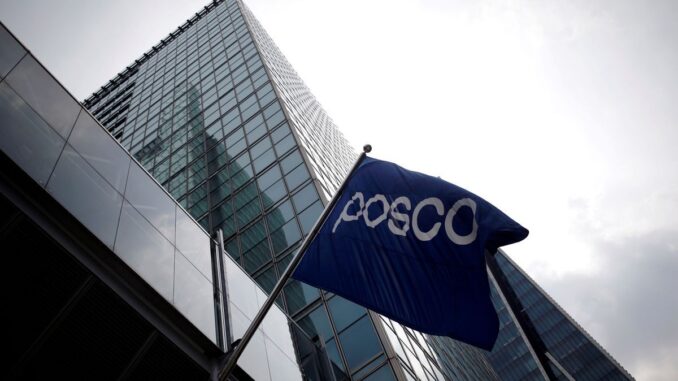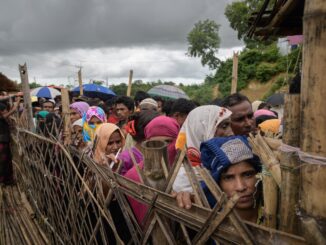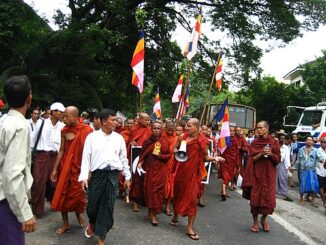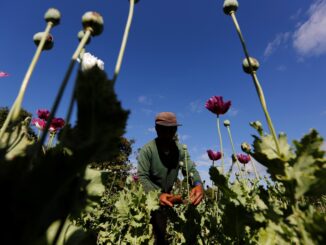
(Bloomberg) — Posco International Corp. is one of the last foreign companies with a significant stake in Myanmar’s oil and gas sector, despite the industry’s ties to a military regime that has been widely condemned for violations of human rights.
The South Korean company also remains a holding in nearly a dozen ESG-focused funds, including those run by BlackRock Inc., State Street Corp. and Samsung Asset Management Co., according to Bloomberg data on the latest available filings. While Posco International derives just a small fraction of its global revenue from Myanmar — less than 4% comes from its energy business overall — its inclusion in ESG funds reflects a dividing line between investors on the issue of human rights. It also demonstrates how ESG investors’ reliance on ratings agencies and index funds can limit scrutiny of specific areas of concern.
BlackRock and State Street declined to comment. Some fund managers, including a representative from Samsung Asset Management, said funds that include Posco track market indexes, while others use ESG ratings to assess their holdings.
Posco International, a subsidiary of the South Korean steelmaker Posco Holdings Inc., is the majority shareholder of one of Myanmar’s largest natural gas fields, which generates as much as $400 million for a military-controlled state-owned enterprise every year, according to Thomas Andrews, the United Nations special rapporteur on the situation of human rights in Myanmar.
During a visit to South Korea in November, Andrews urged companies to make sure their operations don’t directly benefit the junta in Myanmar. Since its military seized power in a coup nearly two years ago, Myanmar state entities have been sanctioned by the US and the European Union. The government has been found guilty of violence against civilians, detention of the press and capital punishment.
“There are a lot of gray areas you can argue or we can argue,” said YK Park, head of responsible investment and governance in the Asia Pacific for Dutch pension fund APG Asset Management. “But this whole Myanmar issue wasn’t a gray area for me — for us.”
APG was one of the first and most outspoken advocates for corporate withdrawal from Myanmar. After the coup, the €524 billion ($557 billion) fund urged its major holdings in the region, including Japanese brewer Kirin and Posco C&C Co., another subsidiary of Posco Holdings, to exit relationships with military associations in the country. Both have since announced their exit from joint ventures with military-affiliated companies.
According to Posco Holdings, an ESG council of the top five Posco Group affiliates requested on-site due diligence into Posco International’s business in Myanmar and its alignment with the company’s human rights policy. “Due diligence is underway on the Myanmar business site,” a spokesperson said in a statement, “and we will disclose the results in the sustainability report next year.”
At present, Posco International retains a 51% stake in the Shwe gas field and a partial stake — 25%, according to The People’s Map — in the South East Asia Gas Pipeline (SEAGP). The company’s first-quarter earnings report shows planned development on the Shwe project through 2024, with another report from last year noting capital expenditures at $788 million. Both projects are jointly held with the state-run Myanmar Oil and Gas Enterprise (MOGE), which was sanctioned by the EU in February for providing “substantive resources” to the Myanmar Armed Forces.
Between April and July of this year, a state newspaper reported, Myanmar’s government earned $800 million on natural gas exports. Since the coup, almost half a dozen multinational companies have withdrawn from energy projects in the country, including TotalEnergies SE and Chevron Corp.
“The Shwe Project serves as a main gas source for the central-northern region of Myanmar and any issue with its operations may bring real and tangible disruptions to the daily life of people in the country,” Posco International said in a statement, adding that the ongoing development had been planned since 2010. “Given such conditions, we believe that the best possible approach to protect people and local communities in Myanmar from harm is to ensure the reliable operation of the project.”
Slipping through the ESG cracks
While ESG investing grows, so have the use of passive funds, which rely on indexes constructed by other firms. BlackRock’s ETF, for example, tracks an index created by MSCI Inc. — Posco International appears in both — which aims to exclude companies that have violated the United Nations Global Compact. The first two principles of the compact call for business to uphold human rights protections, but according to MSCI, the indirect nature of Posco’s involvement in the Myanmar conflict does not meet the criteria for exclusion.
An MSCI spokesperson said that a company could also be screened out if it is involved in a major controversy, but only if it is “specifically and directly implicated in the events causing harm.”
Investors need more transparency when it comes to index managers’ screening methodologies, said Gita Rao, a senior lecturer at MIT Sloan School of Management, who specializes in ESG and impact investing. In this case, Rao said, BlackRock is bound to its prospectus by tracking MSCI’s index passively. “ESG requires active management,” Rao said.
For their part, active managers point to Posco International’s relatively good ESG ratings and current clean energy investments. Hyundai Investment Management cited favorable ratings from Who’s Good, while index manager Korea Exchange Inc. pointed to the same from the Korea Institute of Corporate Governance and Sustainability.
“It’s clear that there partly is a social issue in the company, but we saw that [these assets’] contribution to the company’s profit or corporate value was not significant,” said a spokesperson from South Korean BNK Asset Management, which according to Bloomberg data held a 0.02% stake in Posco International as of July. “At the same time, the company is seen as actively seeking to improve its business related to Myanmar’s military government, such as reducing energy business in Myanmar.”
Human rights groups continue to put pressure on a wide range of companies operating in Myanmar, many of which derive only a small fraction of their revenue from the country. Over 30 of these companies, including Posco, were detailed in a report published in March by the nonprofit Inclusive Development International. According to YK Park of APG, multiple shareholders continue to engage Posco Holdings on this issue, among others.
“What ESG investors should be concerned about is not the amount of revenue that Posco derives from its Myanmar operations,” said David Pred, executive director of Inclusive Development International, “but rather the outsize importance of the revenue its operations provide to the Myanmar junta.”



